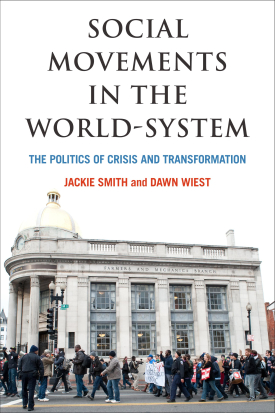
Social Movements in the World-System
About This Book
A Volume in the American Sociological Association’s Rose Series in Sociology
Honorable Mention, 2013 Best Book Award, Political Economy of the World-System Section of the American Sociological Association
Honorable Mention, 2013 Best Book Award, Global and Transnational Sociology Section of the American Sociological Association
Global crises such as rising economic inequality, volatile financial markets, and devastating climate change illustrate the defects of a global economic order controlled largely by transnational corporations, wealthy states, and other elites. As the impacts of such crises have intensified, they have generated a new wave of protests extending from the countries of the Middle East and North Africa throughout Europe, North America, and elsewhere. This new surge of resistance builds upon a long history of transnational activism as it extends and develops new tactics for pro-democracy movements acting simultaneously around the world.
In Social Movements in the World-System, Jackie Smith and Dawn Wiest build upon theories of social movements, global institutions, and the political economy of the world-system to uncover how institutions define the opportunities and constraints on social movements, which in turn introduce ideas and models of action that help transform social activism as well as the system itself. Smith and Wiest trace modern social movements to the founding of the United Nations, as well as struggles for decolonization and the rise of national independence movements, showing how these movements have shifted the context in which states and other global actors compete and interact. The book shows how transnational activism since the end of the Cold War, including United Nations global conferences and more recently at World Trade Organization meetings, has shaped the ways groups organize. Global summits and UN conferences have traditionally provided focal points for activists working across borders on a diverse array of issues. By engaging in these international arenas, movements have altered discourses to emphasize norms of human rights and ecological sustainability over territorial sovereignty. Over time, however, activists have developed deeper and more expansive networks and new spaces for activism. This growing pool of transnational activists and organizations democratizes the process of organizing, enables activists to build on previous experiences and share knowledge, and facilitates local actions in support of global change agendas.
As the world faces profound financial and ecological crises, and as the United States' dominance in the world political economy is increasingly challenged, it is especially urgent that scholars, policy analysts, and citizens understand how institutions shape social behavior and the distribution of power. Social Movements in the World-System helps illuminate the contentious and complex interactions between social movements and global institutions and contributes to the search for paths toward a more equitable, sustainable, and democratic world.
JACKIE SMITH is professor of sociology at the University of Pittsburgh.
DAWN WIEST is senior research analyst at the American College of Physicians.
RSF Journal
View Book Series
Sign Up For Our Mailing List
Apply For Funding
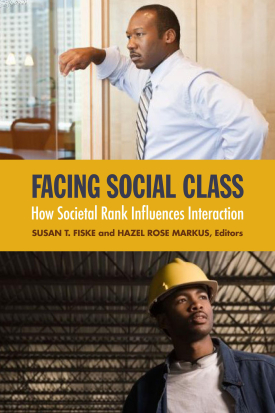
Facing Social Class
About This Book
Many Americans, holding fast to the American Dream and the promise of equal opportunity, claim that social class doesn't matter. Yet the ways we talk and dress, our interactions with authority figures, the degree of trust we place in strangers, our religious beliefs, our achievements, our senses of morality and of ourselves—all are marked by social class, a powerful factor affecting every domain of life. In Facing Social Class, social psychologists Susan Fiske and Hazel Rose Markus, and a team of sociologists, anthropologists, linguists, and legal scholars, examine the many ways we communicate our class position to others and how social class shapes our daily, face-to-face interactions—from casual exchanges to interactions at school, work, and home.
Facing Social Class exposes the contradiction between the American ideal of equal opportunity and the harsh reality of growing inequality, and it shows how this tension is reflected in cultural ideas and values, institutional practices, everyday social interactions, and psychological tendencies. Contributor Joan Williams examines cultural differences between middle- and working-class people and shows how the cultural gap between social class groups can influence everything from voting practices and political beliefs to work habits, home life, and social behaviors. In a similar vein, Annette Lareau and Jessica McCrory Calarco analyze the cultural advantages or disadvantages exhibited by different classes in institutional settings, such as those between parents and teachers. They find that middle-class parents are better able to advocate effectively for their children in school than are working-class parents, who are less likely to challenge a teacher's authority.
Michael Kraus, Michelle Rheinschmidt, and Paul Piff explore the subtle ways we signal class status in social situations. Conversational style and how close one person stands to another, for example, can influence the balance of power in a business interaction. Diana Sanchez and Julie Garcia even demonstrate that markers of low socioeconomic status such as incarceration or unemployment can influence whether individuals are categorized as white or black—a finding that underscores how race and class may work in tandem to shape advantage or disadvantage in social interactions.
The United States has one of the highest levels of income inequality and one of the lowest levels of social mobility among industrialized nations, yet many Americans continue to buy into the myth that theirs is a classless society. Facing Social Class faces the reality of how social class operates in our daily lives, why it is so pervasive, and what can be done to alleviate its effects.
SUSAN T. FISKE is Eugene Higgins Professor of Psychology at Princeton University.
HAZEL ROSE MARKUS is Davis-Brack Professor in the Behavioral Sciences in the Department of Psychology, director of the Center for Comparative Studies in Race and Ethnicity (CCSRE), and director of the Mind, Culture, and Society Lab at Stanford University.
CONTRIBUTORS: Courtney Bearns, Jessica McCrory Colarco, Paul DiMaggio, Susan R. Fisk, Stephanie A. Fryberg, Julie A. Garcia, Crystal C. Hall, Michael W. Kraus, Adrie Kusserow, Annette Lareau, Peggy J. Miller, Miguel Moya, Paul K. Piff, Michelle L. Rheinschmidt, Cecilia L. Ridgeway, Ann Marie Russell, Diana T. Sanchez, Douglas E. Sperry, Nicole M. Stephens, Joan C. Williams.
Related Events & Media
RSF Journal
View Book Series
Sign Up For Our Mailing List
Apply For Funding
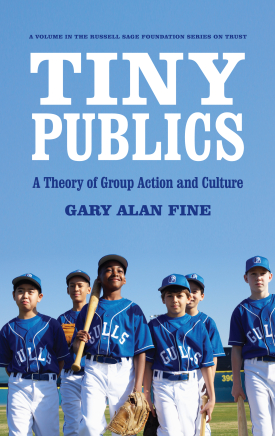
Tiny Publics
About This Book
If all politics is local, then so is almost everything else, argues sociologist Gary Alan Fine. We organize our lives by relying on those closest to us—family members, friends, work colleagues, team mates, and other intimates—to create meaning and order. In this thoughtful and wide-ranging book, Fine argues that the basic building blocks of society itself are forged within the boundaries of such small groups, the "tiny publics" necessary for a robust, functioning social order at all levels. Action, meaning, authority, inequality, organization, and institutions all have their roots in small groups. Yet for the past twenty-five years social scientists have tended to ignore the power of groups in favor of an emphasis on organizations, societies, or individuals. Based on over thirty-five years of Fine's own ethnographic research across an array of small groups, Tiny Publics presents a compelling new theory of the pivotal role of small groups in organizing social life.
No social system can thrive without flourishing small groups. They provide havens in an impersonal world, where faceless organizations become humanized. Taking examples from such diverse worlds as Little League baseball teams, restaurant workers, high school debate teams, weather forecasters, and political volunteers, Fine demonstrates how each group has its own unique culture, or idioculture—the system of knowledge, beliefs, behavior, and customs that define and hold a group together. With their dense network of relationships, groups serve as important sources of social and cultural capital for their members. The apparently innocuous jokes, rituals, and nicknames prevalent within Little League baseball teams help establish how teams function internally and how they compete with other teams. Small groups also provide a platform for their members to engage in broader social discourse and a supportive environment to begin effecting change in larger institutions. In his studies of mushroom collectors and high school debate teams, Fine demonstrates the importance of stories that group members tell each other about their successes and frustrations in fostering a strong sense of social cohesion. And Fine shows how the personal commitment political volunteers bring to their efforts is reinforced by the close-knit nature of their work, which in turn has the power to change larger groups and institutions. In this way, the actions and debates begun in small groups can eventually radiate outward to affect every level of society.
Fine convincingly demonstrates how small groups provide fertile ground for the seeds of civic engagement. Outcomes often attributed to large-scale social forces originate within such small-scale domains. Employing rich insights from both sociology and social psychology, as well as vivid examples from a revealing array of real-work groups, Tiny Publics provides a compelling examination of the importance of small groups and of the rich vitality they bring to social life.
GARY ALAN FINE is professor of sociology at Northwestern University.
A Volume in the Russell Sage Foundation Series on Trust
RSF Journal
View Book Series
Sign Up For Our Mailing List
Apply For Funding
In the last decade, the U.S. has seen a rise in immigration to new destinations where residents may be unfamiliar with immigrants, coupled with an increasing fear of terrorism and other threats to U.S. safety, and, most recently, an economic downturn and widespread unemployment. All of these factors combined have led many to frame immigration to the U.S. as a security issue – based on the argument that immigrants have the potential to threaten the nation’s security (through terrorism) and economy (by taking jobs from the native-born).
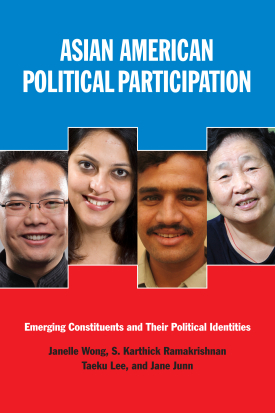
Asian American Political Participation
About This Book
Asian Americans are a small percentage of the U.S. population, but their numbers are steadily rising—from less than a million in 1960 to more than 15 million today. They are also a remarkably diverse population—representing several ethnicities, religions, and languages—and they enjoy higher levels of education and income than any other U.S. racial group. Historically, socioeconomic status has been a reliable predictor of political behavior. So why has this fast-growing American population, which is doing so well economically, been so little engaged in the U.S. political system? Asian American Political Participation is the most comprehensive study to date of Asian American political behavior, including such key measures as voting, political donations, community organizing, and political protests. The book examines why some groups participate while others do not, why certain civic activities are deemed preferable to others, and why Asian socioeconomic advantage has so far not led to increased political clout.
Asian American Political Participation is based on data from the authors’ groundbreaking 2008 National Asian American Survey of more than 5,000 Chinese, Indian, Vietnamese, Korean, Filipino, and Japanese Americans. The book shows that the motivations for and impediments to political participation are as diverse as the Asian American population. For example, native-born Asians have higher rates of political participation than their immigrant counterparts, particularly recent adult arrivals who were socialized outside of the United States. Protest activity is the exception, which tends to be higher among immigrants who maintain connections abroad and who engaged in such activity in their country of origin. Surprisingly, factors such as living in a new immigrant destination or in a city with an Asian American elected official do not seem to motivate political behavior—neither does ethnic group solidarity. Instead, hate crimes and racial victimization are the factors that most motivate Asian Americans to participate politically. Involvement in non-political activities such as civic and religious groups also bolsters political participation. Even among Asian groups, socioeconomic advantage does not necessarily translate into high levels of political participation. Chinese Americans, for example, have significantly higher levels of educational attainment than Japanese Americans, but Japanese Americans are far more likely to vote and make political contributions. And Vietnamese Americans, with the lowest levels of education and income, vote and engage in protest politics more than any other group.
Lawmakers tend to favor the interests of groups who actively engage the political system, and groups who do not participate at high levels are likely to suffer political consequences in the future. Asian American Political Participation demonstrates that understanding Asian political behavior today can have significant repercussions for Asian American political influence tomorrow.
JANELLE WONG is associate professor of political science and American studies and ethnicity at the University of Southern California and director of the Institute of Public Service at Seattle University.
S. KARTHICK RAMAKRISHNAN is associate professor of political science at the University of California, Riverside.
TAEKU LEE is professor of political science and law at the University of California, Berkeley.
JANE JUNN is professor of political science at the University of Southern California.
Related Events & Media
RSF Journal
View Book Series
Sign Up For Our Mailing List
Apply For Funding
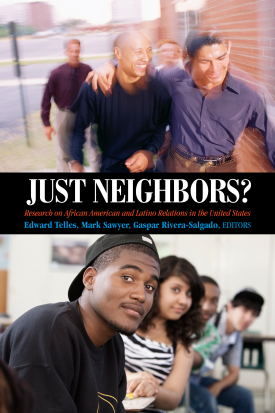
Just Neighbors?
About This Book
Blacks and Latinos have transformed the American city—together these groups now constitute the majority in seven of the ten largest cities. Large-scale immigration from Latin America has been changing U.S. racial dynamics for decades, and Latino migration to new destinations is changing the face of the American south. Yet most of what social science has helped us to understand about these groups has been observed primarily in relation to whites—not each other. Just Neighbors? challenges the traditional black/white paradigm of American race relations by examining African Americans and Latinos as they relate to each other in the labor market, the public sphere, neighborhoods, and schools. The book shows the influence of race, class, and received stereotypes on black-Latino social interactions and offers insight on how finding common ground may benefit both groups.
From the labor market and political coalitions to community organizing, street culture, and interpersonal encounters, Just Neighbors? analyzes a spectrum of Latino-African American social relations to understand when and how these groups cooperate or compete. Contributor Frank Bean and his co-authors show how the widely held belief that Mexican immigration weakens job prospects for native-born black workers is largely unfounded—especially as these groups are rarely in direct competition for jobs. Michael Jones-Correa finds that Latino integration beyond the traditional gateway cities promotes seemingly contradictory feelings: a sense of connectedness between the native minority and the newcomers but also perceptions of competition. Mark Sawyer explores the possibilities for social and political cooperation between the two groups in Los Angeles and finds that lingering stereotypes among both groups, as well as negative attitudes among blacks about immigration, remain powerful but potentially surmountable forces in group relations. Regina Freer and Claudia Sandoval examine how racial and ethnic identity impacts coalition building between Latino and black youth and find that racial pride and a sense of linked fate encourages openness to working across racial lines.
Black and Latino populations have become a majority in the largest U.S. cities, yet their combined demographic dominance has not abated both groups’ social and economic disadvantage in comparison to whites. Just Neighbors? lays a much-needed foundation for studying social relations between minority groups. This trailblazing book shows that, neither natural allies nor natural adversaries, Latinos and African Americans have a profound potential for coalition-building and mutual cooperation. They may well be stronger together rather than apart.
EDWARD TELLES is professor of sociology at Princeton University and vice president of the American Sociological Association.
MARK Q. SAWYER is associate professor of African American studies and political science at the University of California, Los Angeles, and is also director of the Center for the Study of Race, Ethnicity and Politics.
GASPAR RIVERA-SALGADO is project director at the UCLA Center for Labor Research and Education.
CONTRIBUTORS: James D. Bachmeier, Matt A. Barreto, Frand D. Bean, Susan K. Brown, Jessica Johnson Carew, Niambi Carter, Regina M. Freer, Michael Jones-Correa, Gerald F. Lackey, Claudia Sandoval Lopez, Monique L. Lyle, Cid Martinez, Paula D. McClain, Monica McDermott, Tatcho Mindiola Jr., Jason L. Morin, Tatishe M. Nteta, Shayla C. Nunnally, Efren O. Perez, Victor M. Rios, Nestor Rodriquez, Gabriel R. Sanchez, Candis Watts, Rosaura Tafoya-Estrada, James Diego Vgil, Kevin Wallsten, Eugene Walton Jr., Sylvia Zamora.
RSF Journal
View Book Series
Sign Up For Our Mailing List
Apply For Funding
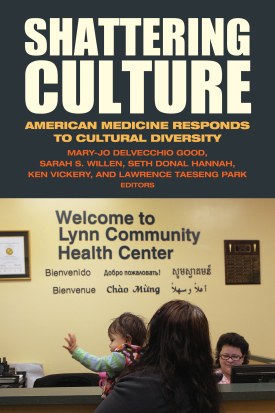
Shattering Culture
About This Book
"Culture counts" has long been a rallying cry among health advocates and policymakers concerned with racial disparities in health care. A generation ago, the women’s health movement led to a host of changes that also benefited racial minorities, including more culturally aware medical staff, enhanced health education, and the mandated inclusion of women and minorities in federally funded research. Many health professionals would now agree that cultural competence is important in clinical settings, but in what ways? Shattering Culture provides an insightful view of medicine and psychiatry as they are practiced in today’s culturally diverse clinical settings. The book offers a compelling account of the many ways culture shapes how doctors conduct their practices and how patients feel about the care they receive.
Based on interviews with clinicians, health care staff, and patients, Shattering Culture shows the human face of health care in America. Building on over a decade of research led by Mary-Jo Good, the book delves into the cultural backgrounds of patients and their health care providers, as well as the institutional cultures of clinical settings, to illuminate how these many cultures interact and shape the quality of patient care. Sarah Willen explores the controversial practice of matching doctors and patients based on a shared race, ethnicity, or language and finds a spectrum of arguments challenging its usefulness, including patients who may fear being judged negatively by providers from the same culture. Seth Hannah introduces the concept of cultural environments of hyperdiversity describing complex cultural identities. Antonio Bullon and Mary-Jo Good demonstrate how regulations meant to standardize the caregiving process—such as the use of templates and check boxes instead of narrative notes—have steadily limited clinician flexibility, autonomy, and the time they can dedicate to caring for patients. Elizabeth Carpenter-Song looks at positive doctor-patient relationships in mental health care settings and finds that the most successful of these are based on mutual “recognition”—patients who can express their concerns and clinicians who validate them. In the book’s final essay, Hannah, Good, and Park show how navigating the maze of insurance regulations, financial arrangements, and paperwork compromises the effectiveness of mental health professionals seeking to provide quality care to minority and poor patients.
Rapidly increasing diversity on one hand and bureaucratic regulations on the other are two realities that have made providing culturally sensitive care even more challenging for doctors. Few opportunities exist to go inside the world of medical and mental health clinics and see how these realities are influencing patient care. Shattering Culture provides a rare look at the day-to-day experiences of psychiatrists and other clinicians and offers multiple perspectives on what culture means to doctors, staff, and patients and how it shapes the practice of medicine and psychiatry.
MARY-JO DELVECCHIO GOODis professor of social medicine at Harvard Medical School and teaches in the Department of Sociology at Harvard University, in addition to being a faculty affiliate of the Asia Center, the Center for Middle Eastern Studies, and the Weatherhead Center for International Affairs.
SARAH S. WILLEN is assistant professor of anthropology at the University of Connecticut.
SETH DONAL HANNAH is lecturer on sociology at Harvard University.
KEN VICKERY is director of external fellowships at the University of Illinois, Urbana-Champaign.
LAWRENCE TAESENG PARK assistant professor of psychiatry at Massachusetts General Hospital.
CONTRIBUTORS: Antonio Bullon, Joseph D. Calabrese, Elizabeth Carpenter-Song, Sadeq Rahimi, Lisa Stevenson, Marina Yaroshenko.
RSF Journal
View Book Series
Sign Up For Our Mailing List
Apply For Funding
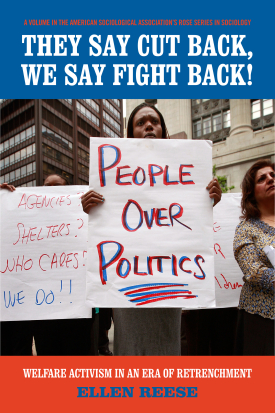
They Say Cut Back, We Say Fight Back!
About This Book
To purchase this title on Amazon, please click here.
A Volume in the American Sociological Association’s Rose Series in Sociology
In 1996, President Bill Clinton hailed the “end of welfare as we know it” when he signed the Personal Responsibility and Work Opportunity Act. The law effectively transformed the nation’s welfare system from an entitlement to a work-based one, instituting new time limits on welfare payments and restrictions on public assistance for legal immigrants. In They Say Cutback, We Say Fight Back, Ellen Reese offers a timely review of welfare reform and its controversial design, now sorely tested in the aftermath of the Great Recession. The book also chronicles the largely untold story of a new grassroots coalition that opposed the law and continues to challenge and reshape its legacy.
While most accounts of welfare policy highlight themes of race, class and gender, They Say Cutback examines how welfare recipients and their allies contested welfare reform from the bottom-up. Using in-depth case studies of campaigns in Wisconsin and California, Reese argues that a crucial phase in policymaking unfolded after the bill’s passage. As counties and states set out to redesign their welfare programs, activists scored significant victories by lobbying officials at different levels of American government through media outreach, protests and organizing. Such efforts tended to enjoy more success when based on broad coalitions that cut across race and class, drawing together a shifting alliance of immigrants, public sector unions, feminists, and the poor. The book tracks the tensions and strategies of this unwieldy group brought together inadvertently by their opposition to four major aspects of welfare reform: immigrants’ benefits, welfare-to-work policies, privatization of welfare agencies, and child care services. Success in scoring reversals was uneven and subject to local demographic, political and institutional factors. In California, for example, workfare policies created a large and concentrated pool of new workers that public sector unions could organize in campaigns to change policies. In Wisconsin, by contrast, such workers were scattered and largely placed in private sector jobs, leaving unions at a disadvantage. Large Latino and Asian immigrant populations in California successfully lobbied to restore access to public assistance programs, while mobilization in Wisconsin remained more limited. On the other hand, the unionization of child care providers succeeded in Wisconsin – but failed in California – because of contrasting gubernatorial politics. With vivid descriptions of the new players and alliances in each of these campaigns, Reese paints a nuanced and complex portrait of the modern American welfare state.
At a time when more than 40 million Americans live in poverty, They Say Cutback offers a sobering assessment of the nation’s safety net. As policymakers confront budget deficits and a new era of austerity, this book provides an authoritative guide for both scholars and activists looking for lessons to direct future efforts to change welfare policy.
ELLEN REESE is associate professor of sociology at the University of California, Riverside.
Download
RSF Journal
View Book Series
Sign Up For Our Mailing List
Apply For Funding

Still Connected
About This Book
National news reports periodically proclaim that American life is lonelier than ever, and new books on the subject with titles like Bowling Alone generate considerable anxiety about the declining quality of Americans’ social ties. Still Connected challenges such concerns by asking a simple yet significant question: have Americans’ bonds with family and friends changed since the 1970s, and, if so, how? Noted sociologist Claude Fischer examines long-term trends in family ties and friendships and paints an insightful and ultimately reassuring portrait of Americans’ personal relationships.
Still Connected analyzes forty years of survey research to address whether and how Americans’ personal ties have changed—their involvement with relatives, the number of friends they have and their contacts with those friends, the amount of practical and emotional support they are able to count on, and how emotionally tied they feel to these relationships. The book shows that Americans today have fewer relatives than they did forty years ago and that formal gatherings have declined over the decades—at least partially as a result of later marriages and more women in the work force. Yet neither the overall quantity of personal relationships nor, more importantly, the quality of those relationships has diminished. Americans’ contact with relatives and friends, as well as their feelings of emotional connectedness, has changed relatively little since the 1970s. Although Americans are marrying later and single people feel lonely, few Americans report being socially isolated and the percentage who do has not really increased.
Fischer maintains that this constancy testifies to the value Americans place on family and friends and to their willingness to adapt to changing circumstances in ways that sustain their social connections. For example, children now often have schedules as busy as their parents. Yet today’s parents spend more quality time with their children than parents did forty years ago—although less in the form of organized home activities and more in the form of accompanying them to play dates or sports activities. And those family meals at home that seem to be disappearing? While survey research shows that families dine at home together less often, it also shows that they dine out together more often.
Americans are fascinated by the quality of their relationships with family and friends and whether these bonds fray or remain stable over time. With so many voices heralding the demise of personal relationships, it’s no wonder that confusion on this topic abounds. An engrossing and accessible social history, Still Connected brings a much-needed note of clarity to the discussion. Americans’ personal ties, this book assures us, remain strong.
CLAUDE S. FISCHER is professor of sociology at the University of California, Berkeley.
Related Events & Media
RSF Journal
View Book Series
Sign Up For Our Mailing List
Apply For Funding
Pagination
- Previous page
- Page 15
- Next page
